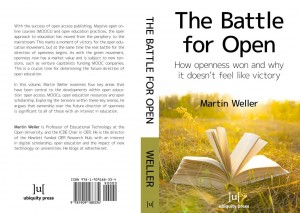Why a book?
Did I mention my Battle for Open book is out? I SAID DID I MENTION MY BOOK IS OUT.
Ahem. Audrey Watters asks why a book, and it’s a question I asked myself with my last book. Here are some thoughts on the process of writing it, and how it relates to blogs and other outputs.
As with the last one, my blog is invaluable. It’s not quite like David’s book which is a collection of his blog posts, but anyone who reads this blog and then the book will be familiar with a lot of its content. When I realised there might be a book to write in this area I went through my blog and copied over anything that was relevant. This came to about 30,000 words. Now, some of that I didn’t use in the end, and nearly all of it I rewrote to an extent (there is a very interesting different tone of voice between book and blog). But nevertheless, for a 60,000 word book, to have nearly half of it in some form straight-off is a real kickstart. Whenever I do my blogging pitch people ask me ‘how do you find the time’, and I often counter that once you get past a certain point, it becomes a time saver. I don’t know how any academic writer functions without a blog. I sometimes found myself writing something and then thinking ‘hold on, haven’t I done something on this before?’ and I’d go back to the blog to find an erudite, well formed and argued article/rambling piece of nonsense that suited my needs.
What I like about a book is that you can make an extended argument, loop forward and refer back within one coherent piece. You can do the referring back in blogs but you write those over an extended period, and they’re usually short pieces. The book allows you a longer run at a subject and you have a reasonably clear idea how these ideas will build on each other. Blogs are much better at capturing thoughts over an extended time frame and for patterns to emerge. Like my last book, I didn’t realise I was in the process of writing this book on my blog for a period of a year or two. Then I began to see a common thread between posts that could benefit from the extended book approach. Again, how do people write books without blogs?
And why a book and not something more creative? Jim Groom might chastise me for being beholden to that text stuff. Alan Levine would have done something far more creative using photos and an application he developed himself. I could answer this by arguing that the form was appropriate for the content, but actually that’s not true. Others could have done something far more innovative and said the same thing. In the end I think it’s because, to paraphrase Laura Marling, I write because I can. It’s what I’m half-decent at, so you may as well go with that.
So, let’s end with some Laura:


3 Comments
Sheila MacNeill (@sheilmcn)
Hi Martin
Thanks for sharing this. Even for a non book writer like me blogging is really important. I often talk about my blog being my professional portfolio and this has become even more apparent to me as I’m in the throws of doing my HEA Senior Fellow application. My blog has been an invaluable reference point for me as well as source of evidence – comments come into their own in that context too.
We have been talking about our department research strategy today and I brought up digital scholarship ( I may even have mentioned your book!) The blogging to book publishing process (or even blog to journal) process is something I think we should all be encouraging more – not just for the way it helps get people into the writing habit, share ideas etc but also in terms of networking and hopefully one day formal recognition of impact.
I had toyed with making a book out of posts I did whilst I was mooc-ing, maybe I will have another look at that. . .
Cedric Gémy
HI Martin
I’m Cedric, teacher in educational sciences in Rennes University. I’m pleased to read to your book actually and i’ve begun a french translation of flossmanuals francophone website (a french tech OER i’m part of, see http://fr.flossmanuals.net/comment-louverture-a-conquis-le-monde/). I’m just at the beginning of my reading but i feel you’re rarely talking about Free and Open Source Softwares. It sounds strange to me as i feel that in France really helped academics to focus on rules to share resources. Of course there were for a while Popular Education and other initiative, but IMO Floss gave a real kick off to the process of a real open sharing.
Is this feeling due to a choice you made or do you think it is a real difference between local experiences ?
admin
Hi Cedric, have you got to chapter 2 yet? I set out FLOSS as one of the main influences in open ed. But you’re right in that I don’t focus on open source software as one of my example chapters. I felt that it was a bit too specific, and might not be applicable to a lot of educational practitioners, whereas I think the others impact ‘regular’ academic practice. So I’ve gone for the line that open source has been a significant influence in the broader open ed movement. But happy to hear an argument to the contrary 🙂
Thanks for reading the book.